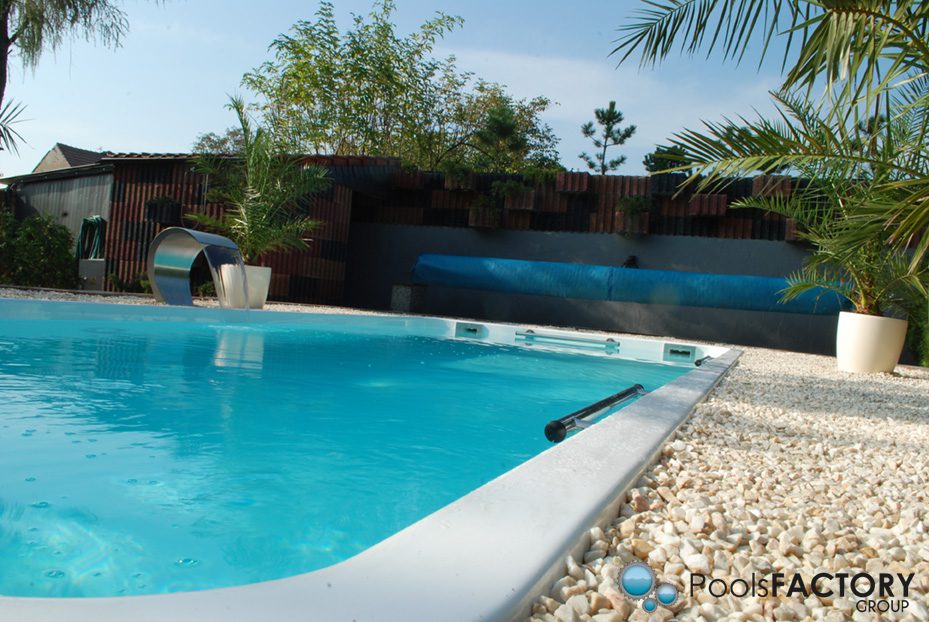YOUR CART
The choice of pool technology depends on many factors, such as preferences, budget, location, climate conditions, and availability of resources. Here are several popular pool technologies:
- Concrete pools: Concrete pools are durable and offer great design flexibility. They can be custom-made, allowing you to adapt their shape, size, and depth to your needs. Concrete pools can be covered with various materials such as ceramic tiles, mosaics, or polyester coatings. However, they require a time-consuming construction process and are usually more expensive than other technologies. The quality of the pool’s interior finish, such as using a liner, is important as it provides complete waterproofing, but wrinkles can form at the seams, which can be aesthetically unpleasing.
- Fiberglass pools: Pools made of fiberglass, also known as polyester pools. Products from PoolsFACTORY GROUP have the Controlled Production Safety certificate issued by the globally recognized certification body TÜV Rheinland. The construction of such a pool is a monolith that arrives at your location as a basin with built-in necessary elements. It is as durable as a small airplane. The lamination technology makes them some of the most durable pools on the market. Fiberglass is used to manufacture boats, yachts, and even small airplanes. The special design, with an obtuse angle at the junction of the pool’s walls and bottom, prevents water from freezing during winter and eliminates the stresses caused by ice. Moreover, they have no sharp edges, and there are many available models and sizes that can be quickly and easily installed at any time of the year. No building permit is required, and if you get tired of the pool in one part of your garden, you can easily dig it up and move it elsewhere since it is not permanently attached to the ground. Fiberglass pools are also easy to maintain. The smooth walls make it easy to remove debris, and you can renew the coating and install any pool equipment. You won’t find a cheaper in-ground pool on the market than a fiberglass pool.
- Plastic pools: Pools made of plastics such as high-density polyethylene (HDPE) or polypropylene (PP). They are corrosion-resistant, easy to clean, and do not require additional finishing. The pool consists of welded polypropylene plates. The welds (joints, seams) are highly visible. The pool walls are very flexible and have a thickness ranging from 0.6 to 1.5cm. There are reinforcements in the form of feathers behind the walls. These reinforcements become visible when the pool is filled with water due to the water pressure on the walls. The installation of a polypropylene pool is difficult, especially backfilling, as the walls are very flexible and backfilling often causes them to bulge inward.
- Vinyl-liner steel pools: These pools are made of flexible PVC liner that is fitted to the shape of the pool. Vinyl-liner pools are relatively easy to install and offer various patterns and colors to choose from. They are available in three shapes (round, oval, and figure-eight). This type of pool does not have stairs, and entry and exit can be done using a ladder. There are no seating areas or loungers, as they are not included. A downside is the vinyl liner that covers the pool. It is rarely well laid, resulting in wrinkles that make it difficult to keep the pool clean. Dirt gets under the folds and accumulates beneath them, and it is practically impossible to thoroughly vacuum the wrinkled bottom. The liner can wear out over time and may require replacement. The right angle between the pool walls and the bottom can cause water to freeze in that area during winter, leading to leaks. The need for retaining walls makes the installation cost of such a pool high. Additional technical complications arise with figure-eight-shaped pools. The installation of a steel pool is only possible on warm and sunny days because the liner used to cover the pool needs to have the appropriate temperature during installation.
- Inflatable and frame pools: If you are unsure whether you want a pool at all, you can consider this option at the beginning. However, there are a few important aspects to consider when owning this type of pool. Inflatable and frame pools are not durable and do not have a professional appearance. They tend to detract rather than enhance the appearance of the garden. They have an unstable structure, and few people can properly set them up, resulting in the pool collapsing if the bottom is not stretched flat. If the pool bottom is not properly stretched, it is practically impossible to vacuum it, which means that when you cannot clean it, you have to empty the pool and refill it with fresh cold water. This situation repeats several times during the season, generating additional costs. Another weak point is the amateur filtration system based on a mini skimmer and a cartridge filter, which cannot properly clean the pool water in a professional manner. Instead of stairs for safe entry and exit, there is an unstable ladder, and there are no resting areas in the pool, such as seating or loungers. When purchasing and operating inflatable and frame pools, professional advice is often not available, and the only advantage is the attractive price.
- Natural pools: Natural or ecological pools are an environmentally friendly solution that uses plants and microorganisms to purify the water. They do not require the use of chemicals for water treatment. However, designing and maintaining natural pools can be more complicated than traditional pools.
Before making a decision, it is important to understand your preferences and requirements for the pool and consult with an expert who can help tailor the technology to your needs and conditions.








